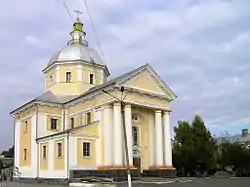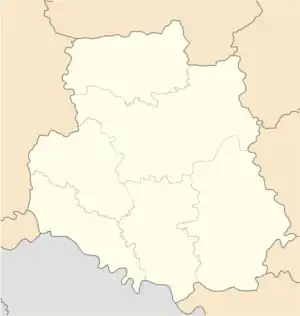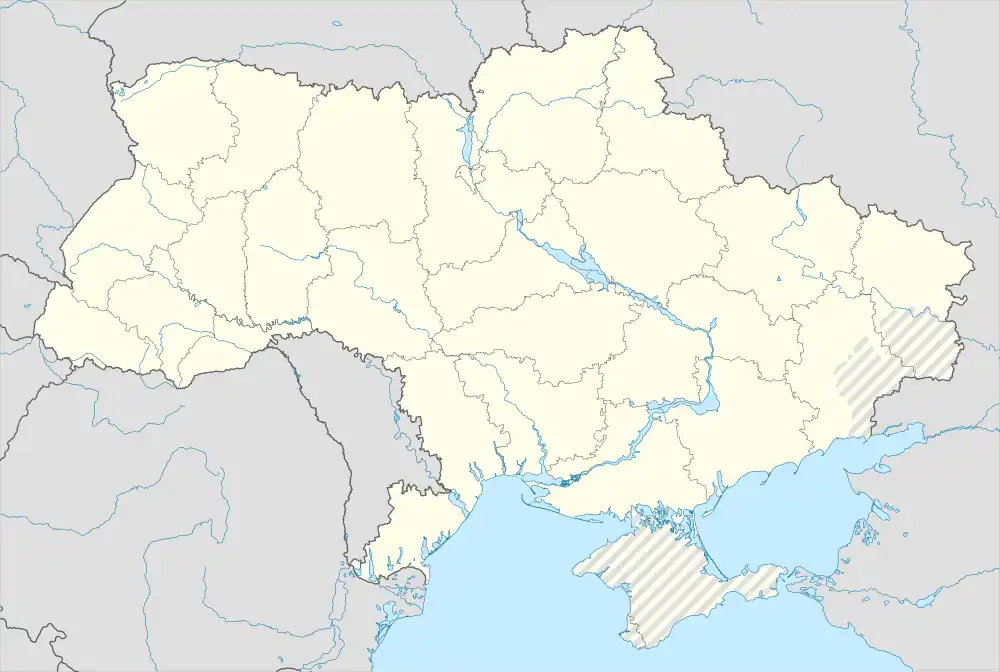Sharhorod
Шаргород Szarogród | |
|---|---|
 Immaculate Conception Church in Sharhorod | |
 Coat of arms | |
 Sharhorod Location of Sharhorod  Sharhorod Sharhorod (Ukraine) | |
| Coordinates: 48°45′N 28°5′E / 48.750°N 28.083°E | |
| Country | |
| Oblast | |
| Raion | Zhmerynka Raion |
| Hromada | Sharhorod urban hromada |
| Founded | 1585 |
| Magdeburg rights | 1588 |
| Area | |
| • Total | 6.87 km2 (2.65 sq mi) |
| Elevation | 245 m (804 ft) |
| Population (2022)[1] | |
| • Total | 6,982 |
| • Density | 1,000/km2 (2,600/sq mi) |
| Postal code | 23500 - 23504 |
| Area code | +380 4344 |
| Website | shargorod-miskrada |
Sharhorod (Ukrainian: Шаргород; Russian: Шаргород, Polish: Szarogród), also known as Shargorod, is a small city located within the Vinnytsia Oblast, Ukraine. It served as the administrative center of the former Sharhorod Raion until its dissolution in 2020. Population: 6,982 (2022 estimate).[1]
History
Early history
Sharhorod was founded in 1579 by Polish–Lithuanian Commonwealth chancellor and hetman, Jan Zamoyski. It was located very close to the border with the Ottoman Empire.
Sharhorod was established as a city under Magdeburg law in 1588.[2]
In the seventeenth century, because of its location along wine and cattle trading routes, Sharhorod emerged as one of the largest towns in Podolia. The Turks occupied Sharhorod between 1672 and 1699, when the town was called "Little Istanbul". During that time, the synagogue was converted into a mosque. In the nineteenth century, the town became a center of Jewish Hasidism.[3]
Rabbi Jacob Joseph of Polonne fled to Raşcov as a result of being exiled from Sharhorod. Having been the rabbi of Sharhorod for several years, Rabbi Jacob Joseph was expelled from his position on a Friday afternoon in 1748. In several of his responsa, which he wrote in Raşcov, he reveals the suffering which he had undergone.[4] He would later leave Raşcov after being appointed rabbi in Nemirov, a center of Hasidism, where he practiced daily fasting for five years, until the Besht came upon him.
From 1776 to 1792, the 7th Polish National Cavalry Brigade was garrisoned in Szarogród.[5]
Sharhorod was briefly described in a book titled: "Geographic Dictionary of Polish Kingdom and other Slavic places," published in Warsaw in Poland.[6]
World War II
Shargorod was occupied by the German nazi army and then by the Romanian fascist army during World War II in 1941–1945. Five thousand Jews were deported to Shargorod from Bessarabia and Bukovina, adding to the 2,000 who were already there. Around seven thousand Jewish people were kept in a ghetto created by the German Nazi army and the Romanian fascist army in Shargorod. Many of the Jews in this ghetto either died of disease or were deported to labor camps, and by 1943 there were about 3,000 Jews left.[7][8][9]
Religious buildings
Orthodox
There is the St. Nicolas Orthodox Monastery, which was founded in Shargorod in 1719, initially constructed in 1782, and finally built in 1806–1818.[10][11][12]
Catholic
There is the St. Florian Catholic Cathedral, which was opened in Shargorod on November 3, 1525.[11][12]
Jewish
There is the Synagogue, which was built in Shargorod in 1589.[11][13][12]
Culture
The international modern arts festival "Art-City: Shargorod" is conducted in Shargorod.[14][15]
Professional painters, amateur painters, art collectors and tourists from various countries like to attend the international modern arts festival "Art-City: Shargorod".[16]
Transportation
Railway transportation
The name of nearest railway station is the Yaroshenka railway station. The distance to the nearest railway station is 28 km.[17]
Automobile transportation
There is a bus station downtown. The distance to Zmerynka is 37 km. The distance to Bar, Ukraine is around 60 km. The distance to Vinnytsia is 80.8 km. The distance to Kyiv is 330 km.
Notable people
Jacob Joseph of Polonne, a Ukrainian rabbi and one of the first and most dedicated of the disciples of the founder of Chassidut, the Holy Baal Shem Tov.
Gallery
 St. Florian Catholic church in Sharhorod
St. Florian Catholic church in Sharhorod Synagogue in Sharhorod
Synagogue in Sharhorod Historic image of Sharhorod
Historic image of Sharhorod
Further reading
Tombstones Define Dying Shtetl in Ukraine, Los Angeles Times, 1997
References
- 1 2 Чисельність наявного населення України на 1 січня 2022 [Number of Present Population of Ukraine, as of January 1, 2022] (PDF) (in Ukrainian and English). Kyiv: State Statistics Service of Ukraine. Archived (PDF) from the original on 4 July 2022.
- ↑ "Шаргород". Вінницька область у складі УРСР | Інформаційно-пізнавальний портал. Retrieved Apr 3, 2020.
- ↑ Veidlinger, Jeffrey, "In the Shadow of the Shtetl: Small Town Jewish Life in Soviet Ukraine", Indiana University Press, 2013 p.28
- ↑ Dresner Zaddik; p. 57
- ↑ Gembarzewski, Bronisław (1925). Rodowody pułków polskich i oddziałów równorzędnych od r. 1717 do r. 1831 (in Polish). Warszawa: Towarzystwo Wiedzy Wojskowej. p. 9.
- ↑ "Słownik geograficzny Królestwa Polskiego i innych krajów słowiańskich, Tom XI - wynik wyszukiwania - DIR" [Geographical dictionary of the Kingdom of Poland and other Slavic countries, Volume XI - search result - DIR]. dir.icm.edu.pl (in Polish). Retrieved Apr 3, 2020.
- ↑ "Історія міста Шаргород" [History of the city of Shargorod] (in Ukrainian). Archived from the original on 2016-08-21. Retrieved 2020-12-10.
- ↑ Ploscariu, Iemma (January 2019). "The Shargorod Ghetto During the Holocaust in Romanian Transnistria". Nationalities Papers. Cambridge University Press. 47 (1): 121–135. doi:10.1017/nps.2018.16. S2CID 158395220.
- ↑ "Shargorod". Jewish Virtual Library. Retrieved February 21, 2022.
- ↑ "Свято-Николаевский Шаргородский мужской монастырь | Официальный сайт монастыря". shargorod-mon.church.ua. Retrieved Apr 3, 2020.
- 1 2 3 "Шаргород". castles.com.ua. Retrieved Apr 3, 2020.
- 1 2 3 "Шаргород | Украина Инкогнита". ukrainaincognita.com. Retrieved Apr 3, 2020.
- ↑ "Шаргород". Электронная еврейская энциклопедия ОРТ. Retrieved Apr 3, 2020.
- ↑ "Арт-Шаргород: шок и трепет - Культура - останні новини театру, кіно, музики і мистецтва - gazeta.zn.ua". Archived from the original on 2016-04-07. Retrieved 2016-05-26.
- ↑ "GRAFFITIZONE". graffitizone.kiev.ua. Retrieved Apr 3, 2020.
- ↑ "Karas Gallery - Karas Gallery". www.karasgallery.com. Archived from the original on 2 June 2010. Retrieved 17 January 2022.
- ↑ "Офіційний веб-сайт Укрзалізниці". www.uz.gov.ua. Archived from the original on September 22, 2021. Retrieved Apr 3, 2020.